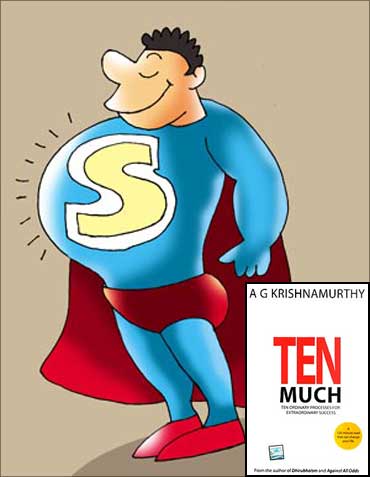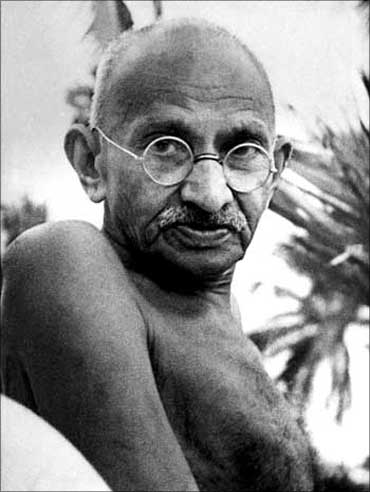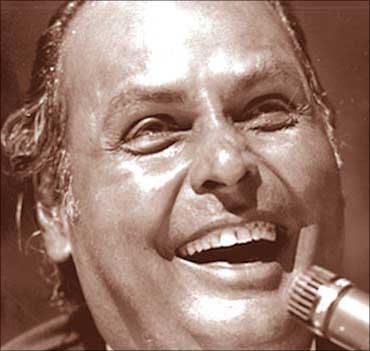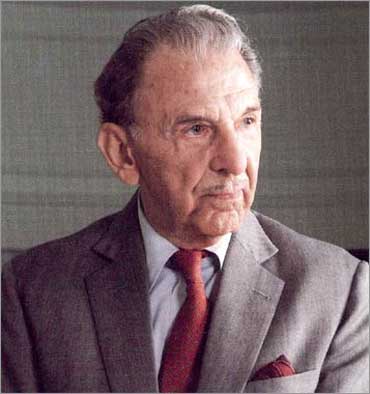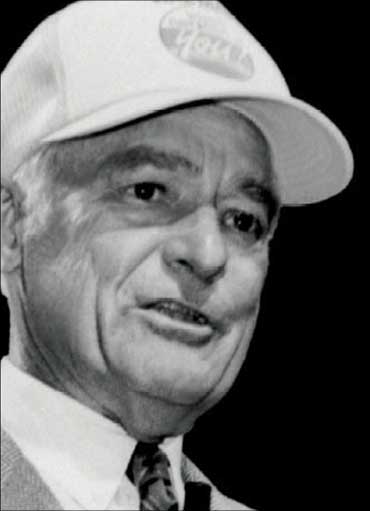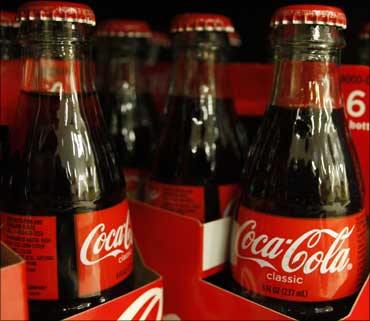 | « Back to article | Print this article |
What made JRD Tata, Dhirubhai Ambani great leaders
Willingness to bet on your team is perhaps the simplest way to win the lifelong loyalty of your people, and let the world know that you possess one of the rarest of all leadership qualities -- the ability to inspire unshakeable loyalty, a precious asset in today's dog-eat-dog world.
The reasoning is simple: when trust is placed in a person to handle a job he will try everything in his power to reassure you that you made the right decision by putting him in charge. But, yes, a lot of courage is required for you to bet on your people. It is not easy. The stakes are tremendous and it requires that you expect mistakes to be made, sometimes costly ones, but it is mandatory not to give up your faith in the people you put in charge. In fact, this will strengthen their belief in your and double their resolve to perform even better.
But not many leaders are able to do so easily, perhaps because it demands a lot from them or maybe it's because the rewards are not tangible and do not translate immediately into fiscal returns. Whatever the reason, there's no denying that trusting your team and vice versa is definitely no walk in the park.
Click NEXT to read on. . .
Excerpted from: TEN Much: Ten Ordinary Processes For Extraordinary Success, by A G Krishnamurthy. Reproduced with permission from Tata McGraw-Hill Publishing Company Limited. Price: Rs 195. Copyright 2010.
Don't preach what you do not practice
So what does it take for a leader to place such long-term trust in his team? Having a couple of qualities would help:
1. The Americans call it 'walking the talk'.
In India we have 'Yatha raja, tatha praja'. Though not exactly the same thing, the nuances of both are pretty similar. To put it simply, there is no point in preaching what you do not practice, because your team models itself on your behaviour.
If you have habits that are dangerous to the overall health of the company or the country, you can be pretty sure that before long your people are bound to follow in your footsteps. The obvious argument being, 'if the king -- or in the case of a company, the chairman -- can do it, why can't I?' And one bad habit multiplied a thousand fold is bound to bring the strongest citadel down! Good habits are also echoed in this manner.
There is this charming story of Mahatma Gandhi and a little boy who loved jaggery. The story goes that the boy's mother brought him to Gandhi and requested him to ask the boy to stop his habit. Gandhi refused to comply immediately, instead asked the mother to come back after a couple of weeks.
Click NEXT to read on. . .
Like it or not, the leader is the role model for the team
When the two of them returned, Gandhi told the boy to stop eating jaggery. Surprised, the mother asked him why he waited and he replied that he could not have advised the child a couple of weeks earlier as he himself used to eat jaggery. He had to try it himself before he could tell the child to do so!
The simplest and most visible of all company rules that are couched in hypocrisy is the one on punctuality, where the employee is expected to be at his desk at a given time and in some cases his pay is cut as well when he doesn't, and the leadership saunters in a good couple of hours later, invariably at mid-day.
The result: a disengaged employee who thence forward grudgingly carries out his duties under a cloud of resentment.
On the other hand, I have seen very few instances of tardiness when the boss man is one of the first to arrive at work.
Like it or not, the leader is the role model for the team and it is he who sets the pace for everything that happens.
I remember being quite casual about my work until I met Dhirubhai (Reliance founder Dhirubhai Ambani) who was more engaged than any of us were about work. In the face of such commitment from the top, it is very rare that the employees can dream of adopting a lackadaisical attitude.
2. Share the credit, share the profits, share the success.
There is a colloquial Indian saying: 'Success has many fathers, failure none'.
Click NEXT to read on. . .
JRD Tata credited his executives for everything
It's only human. People love being a part of other people's successes and tend to run away when there is a failure. It's not fair; it reveals an obvious character flaw, which is all the more reason why it is necessary for a leader to be magnanimous.
People need to constantly feel good about themselves (whether they deserved it or not!) and it is up to the leader to play a parent figure in such instances. So when there is occasion for celebration, it is good for team morale to spread the credit as far as possible.
And of course when it is blame time, the leader has to stand up and take full public responsibility: privately, of course, the responsible have to be held accountable. When this is practiced over a period of time, the team realizes that yours is an environment where they feel safe and secure, a place where their weaknesses are not exposed to the criticism of their colleagues. The reward for such magnanimity is that apart from earning loyalty, an employee who feels secure transforms into a positive force infusing a similar energy into those around him.
There is nothing more harmful to a team than insecurity. It is cancerous in nature, eating away at the spirit and morale of not only those infected with it but destroying everyone who comes into contact with them.
A classic example of a business leader known for sharing credit is JRD Tata. Even when he analysed his own performance, he would insist that his only real contribution to the group was Air India! He credited his executives for everything else.
As one of the senior Tata executives, Darbari Seth, once said, "Mr Tata was able to harness a team of individualistic executives, capitalising on their strengths, downplaying their differences and deficiencies; all by the sheer weight of his leadership."
It was Tata's skill in people management that would eventually create giants such as Sir Homi Mody, Sir Ardeshir Dalal, Sir Jehangir Ghandy, Russi Mody, Sumant Moolgaokar and Darbari Seth and others who created billions in wealth for the group and the country.
Click NEXT to read on. . .
Wal-Mart founder Sam Walton always kept in touch with his people
The idea of sharing profits is also founded on the same ideology. And many companies now adopt the practice of sharing profits among their employees. For instance, Infosys put this into practice way back in the late 90s when Narayana Murthy distributed the company's profit through a stock option programme, thus paving the way for the robust company that Infosys has become today.
3. Be a visible leader. One of the problems when companies become really large is that the leadership often disappears into the clouds.
Employees way down below rarely catch a glimpse of the great name heading the organisation and pretty soon become disenchanted and a frustrated few may even look to sell out the company at the first opportunity.
Leaders need to be 'felt and touched'. Rapport unfortunately can be established only with a one on one interaction. Not through visualization.
Wal-Mart's founder Sam Walton was well-known for his ability to keep in touch with his people despite the fact that he chain had grown into the world's largest retailer. He could pilot his own aircraft, so he would fly into towns unannounced.
An employee recollects his first meeting with the big man. One day, Sam Walton walked into the store unannounced, at 7:00 am, the time they opened for the employees. After doing his rounds of the place, he called for an impromptu meeting. Of course there were no chairs as no one was prepared, so he asked everyone to sit on the floor while he got onto his knees and talked to them about customer service.
It was an encounter, the employee will never forget. He recalls that Sam Walton made them feel very good about themselves in his talk that day. "He was down to earth, a real good ole' boy who gave you the feeling that he didn't have any more than anybody else in the world.
Click NEXT to read on. . .
Favouritism is always at the expense of talented performers
He brought himself down to the people's level by dealing with them and talking with them which made very one feel comfortable and at ease talking with him. You felt you could ask him anything.
Sam continued his interaction with his people through every possible means. He would sit in the Wal-Mart studio in Bentonville and talk to his associates via live TV or radio. He managed to successfully squash many a union organising when he directly dealt with his people this way.
The best leaders are teachers and once an employee is able to feel that he knows his leader personally and that he has, maybe, even learnt something through that brief moment of interaction, he will invariably carry with him a deep sense of gratitude for that window of opportunity.
4. Leadership should be transparent.
Perhaps the most important quality in building two-way trust is transparency. Transparency in all spheres. In all dealings. No hidden agendas. No games. No patronizing your community. No special favours for relatives. A sense of fair play and an ability to make every contributing employee feel equally wanted and recognised.
Such fairness not only ensures trust, it is very good for the bottomline. Favouritism, be it for family, community or political affiliations, is always at the expense of talented performers and that simply makes no business sense whatsoever. Most businesses invariably become successful only when its founder exercises this belief to the fullest.
Click NEXT to read on. . .
Adopt high integrity to gain the trust of employees
After all, it is transparency that invites credibility. Ad to achieve transparency, it is vital that the leader himself has integrity. A person of integrity is the same on the inside and the outside. Predictable reactions, honest dealings, well-controlled emotions, absence of tantrums and harsh outbursts are all signs of integrity.
As a consequence, such a leader is always approachable.
It is necessary to adopt a higher level of ethics and integrity in order to gain the trust of employees, customers, shareholders and government. Adopting transparent business models and having a corporate culture that set expectations for the individual are good ways to begin.
Transparency seems to have faded away in most businesses that today there's a lot of talk of how necessary it is to be so. In fact, some business schools have begun to include it in their syllabi.
And when few businesses do practice transparency in their dealings, it makes news. I remember reading not so very long ago about PepsiCo's 'amazing' integrity.
Apparently, a secretary who worked for a Coca-Cola brand executive reportedly tried to sell stolen documents and a sample of a drink in development to their rival PepsiCo. But Pepsi rejected the offer and informed Coca-Cola.
Click NEXT to read on. . .
What made JRD Tata, Dhirubhai Ambani great leaders
And then we have the story of Anne Mulcahy of Xerox, who became CEO of Xerox in 2001. Five months later, she told the financial markets that the company's business model was flawed and simultaneously came clean with the employees about the challenges they faced, thus beginning the company's remarkable turnaround.
Some leaders deal with the issue by putting down their expectations in writing. Dell Inc, for instance has a book called The Soul of Dell. It provides specific guidance for employees 'regarding the company's standards and behaviour.'
According to their website, they even have a global ethics council comprising of senior business leaders who are in charge of drafting and implementing the code in their companies across the world.
Yes, transparency is a serious issue because at the end of the day, it is the openness of the man on top that filters down to his team, whose collective behaviour in turn is responsible for that crucial business asset of all -- credibility.
It requires for the head of the organisation to be an alloy of all the above qualities to evoke his team's trust in him. Once he is confident that he carries credibility with his people, he in turn will able to bet on them.
And when this relationship grows through a business's normal ups and downs, both team and leader will go to any lengths for each other. That is the secret how some leaders are able to hand over phenomenal charge to their people and how they in turn dedicate themselves completely to them.
Excerpted from: TEN Much: Ten Ordinary Processes For Extraordinary Success, by A G Krishnamurthy. Reproduced with permission from Tata McGraw-Hill Publishing Company Limited. Price: Rs 195. Copyright 2010.
